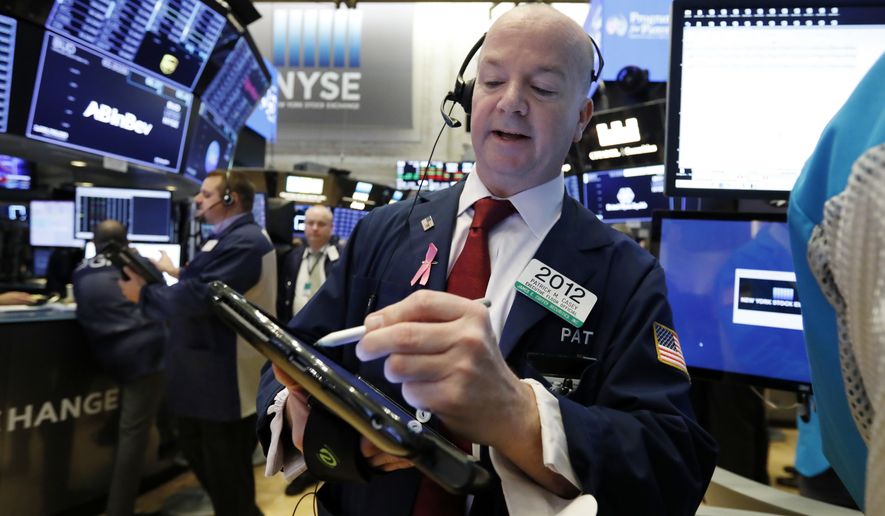President Trump defended his handling of the trade war with Beijing on Thursday as Wall Street suffered another steep slide, led by Apple’s slowdown in iPhone sales in China and weak growth at U.S. factories in December.
Mr. Trump said his tariff war with China “had to be done” and that Washington has collected billions of dollars from the levies on Chinese imports.
“The United States Treasury has taken in MANY billions of dollars from the Tariffs we are charging China and other countries that have not treated us fairly,” the president tweeted. “In the meantime we are doing well in various Trade Negotiations currently going on. At some point this had to be done!”
The Dow Jones Industrial Average fell 660 points Thursday, losing about 2.8 percent of its value. The slide came after Apple CEO Tim Cook said quarterly revenue would be lower than expected, blaming poor iPhone sales, China’s slowing economy and trade tensions with Beijing.
The iPhone is Apple’s biggest product, accounting for about 60 percent of its revenue. The company’s stock fell nearly 10 percent Thursday, wiping out more than $70 billion in market value.
The drop in Apple shares also was a blow to workers’ 401(k) retirement funds. Several popular mutual funds have Apple stock as their largest holding.
During a surprise appearance in the White House press room after the markets closed, Mr. Trump said the U.S. is being inundated with immigrants from Central America entering the U.S. illegally because the economy is so good.
“The economy is bringing people in, because we’re doing so well with the economy. Unemployment is 3.7 percent,” he said.
The U.S. and China have declared a 90-day truce in their tariff war, and trade talks are set to resume. But the tariff fight and an avalanche of bad news about tumbling auto and real estate sales are undermining consumer confidence after two decades of almost unbroken rapid growth.
“It’s definitely worrying,” said China specialist David Dollar, senior fellow at the Brookings Institution. “Overall, consumption growth is slowing down in China.”
The Apple news shows how vulnerable many big U.S. companies are to a slowdown in China, especially as the world’s two biggest economies seek to settle a contentious trade dispute.
“It’s not going to be just Apple,” Kevin Hassett, chairman of the White House Council of Economic Advisers, told CNN on Thursday.
He said many companies have a lot of sales in China and will “be watching their earnings downgraded next year until we get a deal with China. And I think that puts a lot of pressure on China to make a deal.”
At a Cabinet meeting Wednesday, Mr. Trump again blamed the Federal Reserve for raising interest rates too quickly and worrying investors.
“We need a little help from the Fed,” the president said.
Mr. Trump also said the weakening global economy is affecting the U.S.
“The world, you know, does have an impact on us,” he said. “The world isn’t doing so well, unfortunately. China has gotten hit hard, and other places have been hit hard.”
Mr. Hassett told reporters that the 13-day-old government shutdown shouldn’t have a significant effect on the U.S. economy.
“The private-sector repercussions seem like they are going to be pretty small,” he said.
The government’s unemployment report for December is due out Friday. Mr. Hassett said the shutdown could translate to “a big negative” in the January jobs numbers, but he added those workers will ultimately be paid.
He estimated that the gross domestic product in the first quarter could drop by about one-tenth, if the shutdown is resolved by next week.
U.S. factories grew last month at the slowest pace in more than two years, with some manufacturers complaining about the impact of Mr. Trump’s trade policies.
The Institute for Supply Management, an association of purchasing managers, said Thursday that its manufacturing index dropped to 54.1 in December, down from 59.3 in November and the lowest level since November 2016. The December drop — the biggest in a decade — was worse than economists had expected.
But payroll processor ADP said Thursday that businesses added a robust 271,000 jobs in December, a sharp upturn from November’s gain of 157,000.
The growth at December’s pace suggests that the U.S. economy is unlikely to fall into a recession, said Mark Zandi, who prepares the ADP report as chief economist at Moody’s Analytics.
• This article is based in part on wire service reports.
• Dave Boyer can be reached at dboyer@washingtontimes.com.




Please read our comment policy before commenting.